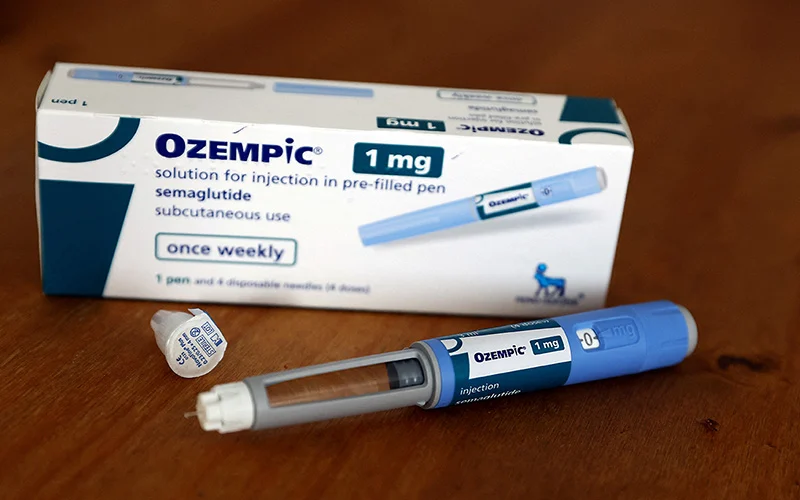
WASHINGTON, Dec 4, 2023 (BSS/AFP) - Like many Americans struggling to lose
weight, Marissa Montanino felt compelled to try Ozempic or one of the other
new so-called "wonder drugs" described as revolutionary in the fight against
obesity.
"I would work out sometimes three times a day, I was doing hours worth of
classes. I was eating really, really clean... and nothing was changing" the
36-year-old esthetician told AFP in a recent interview.
"I heard about Ozempic for a while and then you start to see other people
doing it like celebrities and then dropping weight super fast," she said.
Fearing gastrointestinal issues, a side effect of the drugs, Montanino sought
reassurance from clients at her studio and in Facebook support groups.
"I was scared. I was super nervous. I am terrified of being nauseous," she
said.
Ultimately deciding to take the leap, Montanino was not prescribed Ozempic,
made by Danish drugmaker Novo Nordisk, but rather "compounded" semaglutide.
It's an option many in the United States are turning to over cost or supply
problems with the brand name drugs -- but which experts and officials have
flagged for possible risks.
Over 40 percent of Americans suffer from obesity, reflecting a major health
crisis and the massive market for new Ozempic-type drugs.
With their "groundbreaking" effectiveness, the drugs will be "the first line
therapy for people who are obese," research physician Samuel Klein of
Washington University in St. Louis told AFP.
- Soaring demand -
Semaglutide is the active ingredient in both Ozempic -- approved as a
diabetes treatment in 2017 -- and Novo Nordisk's Wegovy, which gained
authorization as an obesity medicine in 2021.
In addition to the millions of diabetic and obese patients seeking out the
drugs, countless others without severe health issues are asking doctors for
"off-label" prescriptions.
Celebrities, including Elon Musk, have also said they take the drugs to shed
pounds -- fueling skyrocketing interest.
"The major problem is that it is now difficult to get the medications," said
Klein. "There's not enough medication being made."
The US Food and Drug Administration (FDA) classifies semaglutide and
tirzepatide -- the compound used by Eli Lilly in its drugs Mounjaro and
Zepbound -- as currently "in shortage."
The designation means some restrictions may be lifted, allowing the
compounding of drugs that are "essentially copies of approved drugs," the FDA
says.
Compounding, the creation of custom drugs, has historically been used when a
patient has an allergy to a medicine's component.
Obesity specialist Andrea Coviello told AFP she is concerned about patients
taking compounded weight loss drugs, often ordered online.
Though some of her patients who say they've tried the compounded drugs lost
weight, it's "unclear what these patients are actually receiving," the UNC
School of Medicine professor and physician said.
Montanino, who is just over five feet (1.53 meters) tall, says that in less
than six months using the weekly injections, she has gone down from 157
pounds (71.2 kilograms) to around 130. Her target is 125.
She said that in her group chat with others taking weight loss drugs, only
one was on brand name Wegovy, and that "everybody's super happy."
- 'I'm happier in my skin' -
US authorities warn that "compounded drugs pose a higher risk to patients
than FDA-approved drugs" because they "do not undergo FDA premarket review
for safety, effectiveness, or quality."
Without further details, it says it has "received adverse event reports after
patients used compounded semaglutide."
An online search for compounded weight loss drugs produces handfuls of
retailers offering to ship the medicine by mail.
Advertised prices are much lower than the brand name sticker price, but not
necessarily cheaper than when insurance covers it.
Montanino said she initially paid $300 for a three-month supply, but as the
dosage increases over time it could eventually become $300 per month.
Given the booming demand for the drugs, it is unclear when they may come off
the shortage list.
Already earning billions each quarter on their branded weight-loss
medications, Novo Nordisk and Eli Lilly stand to gain even more if they can
remove the "shortage" designation, and are ramping up production.
Both have also filed multiple suits against compounding pharmacies, which are
making their way through court.
Despite the uncertainty, Montanino said she intends to keep using the drugs,
"for life" if possible.
She and her husband, whom she says also lost 50 pounds, celebrated their
weight loss by retaking wedding photos on their one-year anniversary.
"I'm happier in my skin. I'm happier with how clothes fit. I hate saying
that... But for me, it makes me feel better."